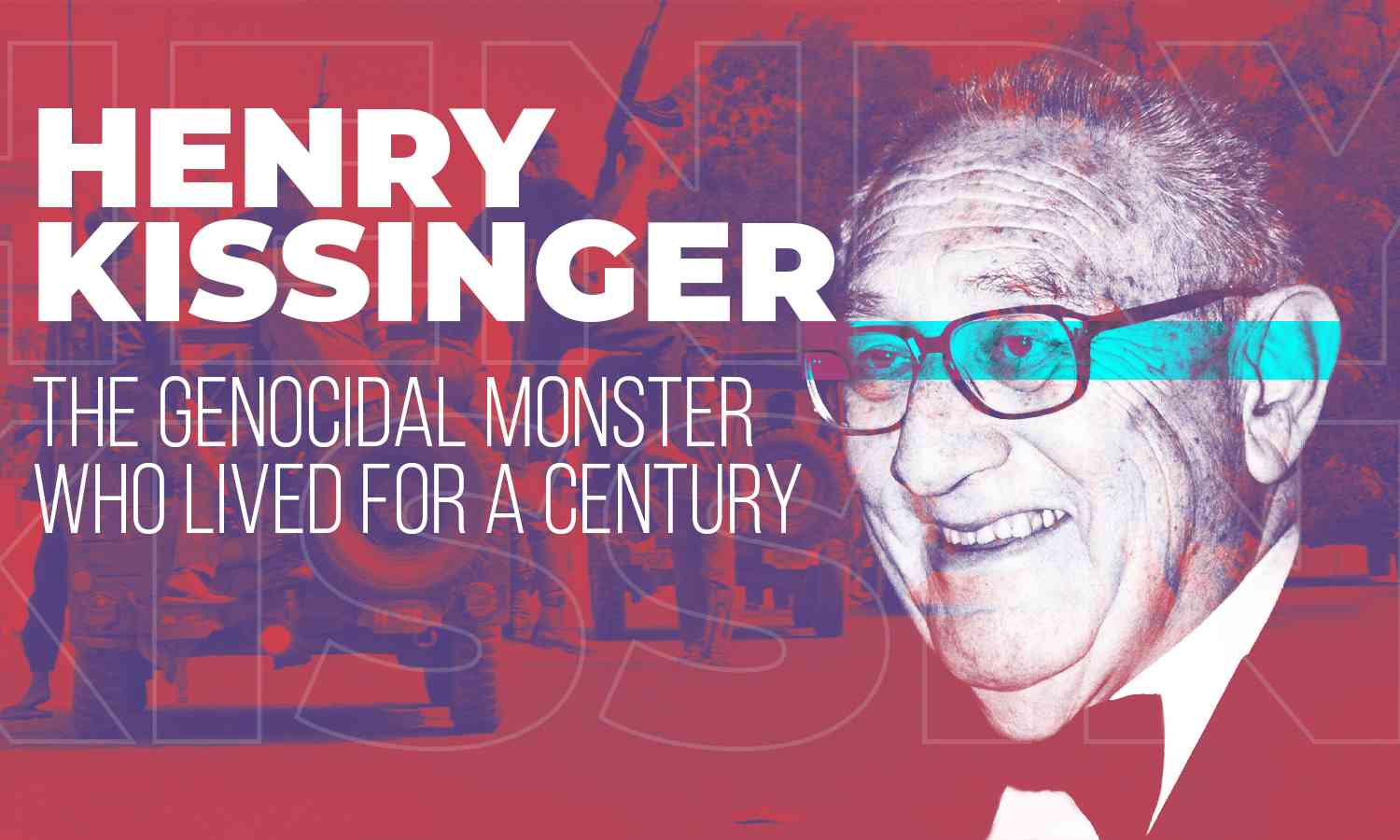Anthony Bourdain said about Henry Kissinger - “Once you’ve been to Cambodia, you’ll never stop wanting to beat Henry Kissinger to death with your bare hands. You will never again be able to open a newspaper and read about that treacherous, prevaricating, murderous scumbag sitting down for a nice chat with Charlie Rose or attending some black-tie affair for a new glossy magazine without choking. Witness what Henry did in Cambodia – the fruits of his genius for statesmanship – and you will never understand why he’s not sitting in the dock at The Hague next to Milošević.”
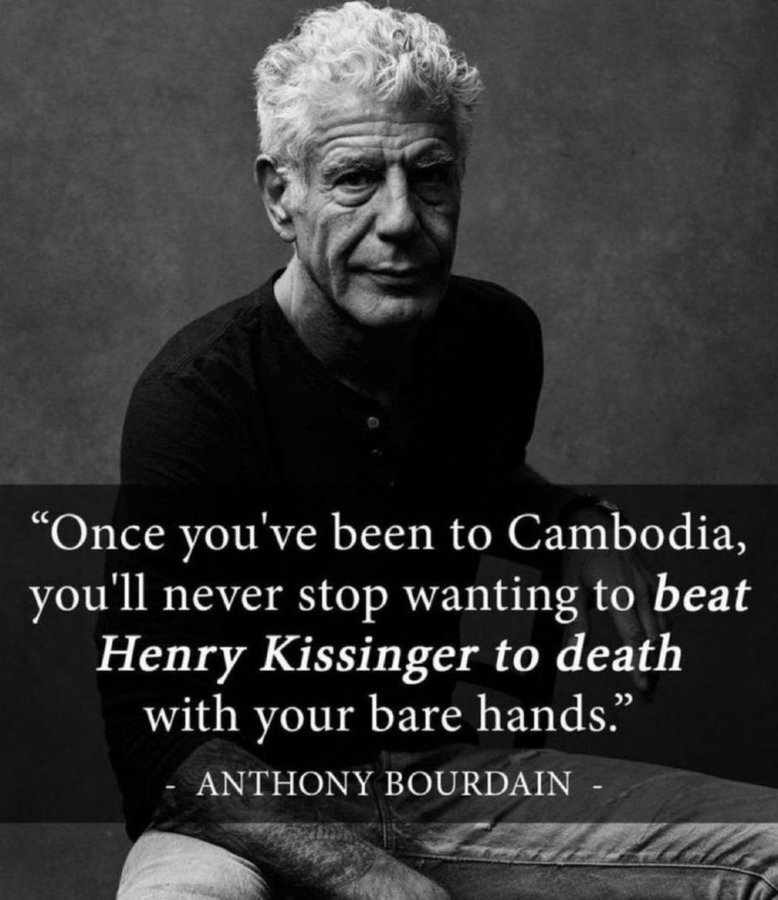
Henry Kissinger died today. He lived for a hundred years, and never took any responsibility of his actions that directly led to millions dying across the globe. Kissinger's impact reverberates far beyond the fatalities, trauma, and anguish of the individuals affected by his actions. His policies set the groundwork for civilian devastation in the U.S. war on terror, spanning from Afghanistan to Iraq, Syria, Somalia, and beyond. Serving as secretary of state and national security adviser under Presidents Richard Nixon and Gerald Ford, Kissinger wielded substantial influence over the Vietnam War and the broader Cold War against the Soviet Union.
Conservative estimates suggest that the despotic regimes Kissinger backed and the conflicts he sanctioned were responsible for millions of deaths and countless human rights violations, both during and after his tenure in the American government. Throughout his life, Kissinger displayed no remorse for these actions and faced no real consequences. He maintained a derisive attitude toward critics of his human rights record and continued to hold a revered position within elite Washington political circles until his passing.
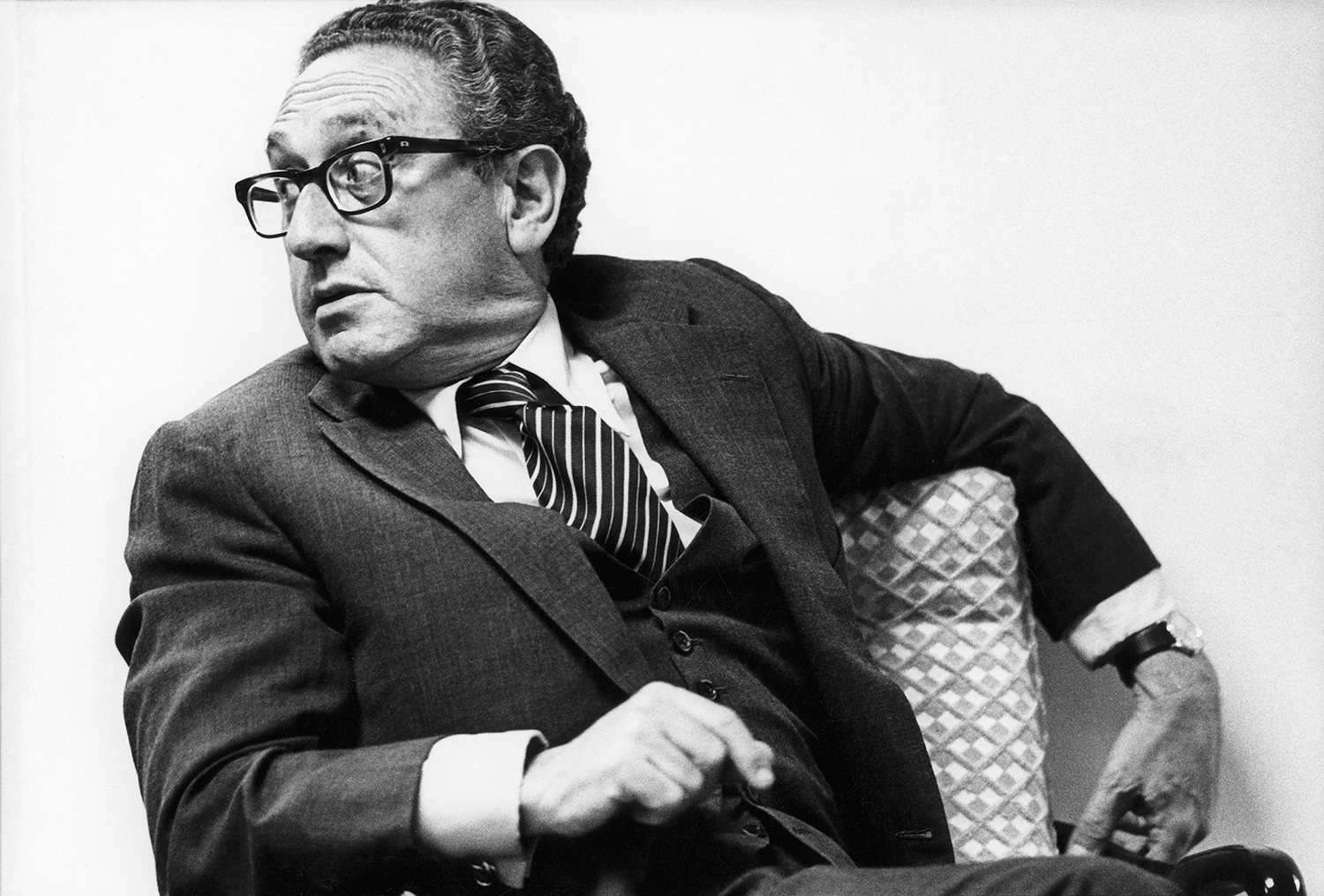
Henry Kissinger - The War Criminal
One of the most notorious acts attributed to Kissinger was his clandestine four-year bombing campaign in Cambodia, an impartial nation with which the United States was not in conflict, resulting in countless civilian casualties. Leading the American foreign policy apparatus, Kissinger also facilitated illicit arms sales to Pakistan during its ruthless crackdown on the Bengali population in 1971. He supported the 1973 military coup that ousted a democratically elected socialist government in Chile, sanctioned Indonesia's invasion of East Timor in 1975, and endorsed Argentina's repressive military regime during its brutal suppression of dissidents and leftists in 1976. His policies during the Ford administration also fuelled civil wars in Africa, particularly in Angola.
President Barack Obama came close to expressing remorse for the United States' involvement in a human rights tragedy during his visit to Argentina. Obama acknowledged the need for self-reflection on American policies and history, particularly regarding the nation's delayed advocacy for human rights in cases such as the "dirty war." He pledged to declassify numerous documents concerning the dictatorship's oppressive rule and U.S. support during that period. However, this review appeared swift. Only two months later, the Obama administration awarded Henry Kissinger, identified in these documents for his association with Argentine military dictator Jorge Rafael Videla in the 1970s, the Distinguished Public Service Award, the Pentagon's highest civilian honour.
_1701336649.jpg)
A Brief History of Kissinger
Drafted into the U.S. Army in 1943, Kissinger served in Germany during World War II and excelled as an intelligence agent. His achievements included earning a Bronze Star for successfully tracking down members of the Gestapo, the Nazis’ clandestine police force, in the immediate post-war period. After his return to the U.S. and completion of studies at Harvard, he swiftly rose to wield substantial influence in foreign policy circles. Notably, Kissinger gained recognition within the establishment by advocating that President Dwight D. Eisenhower recognise the potential necessity of a "limited nuclear war" in Europe to safeguard the U.S. and its allies against the growing threat posed by the Soviet Union.
Kissinger's rapid climb in foreign policy circles owed much to his adept political manoeuvring. He provided counsel on diplomacy and foreign policy to both Republican President Eisenhower and Democratic President John F. Kennedy. Kissinger also advised former New York Governor Nelson Rockefeller in three presidential bids. Even when Rockefeller failed to secure the GOP nomination in 1968, Kissinger maintained positive relationships with both Richard Nixon, the Republican candidate, and Democrat Hubert H. Humphrey throughout the general election. It was widely expected in Washington that Kissinger would assume a prominent role in the next administration, irrespective of the election's outcome.
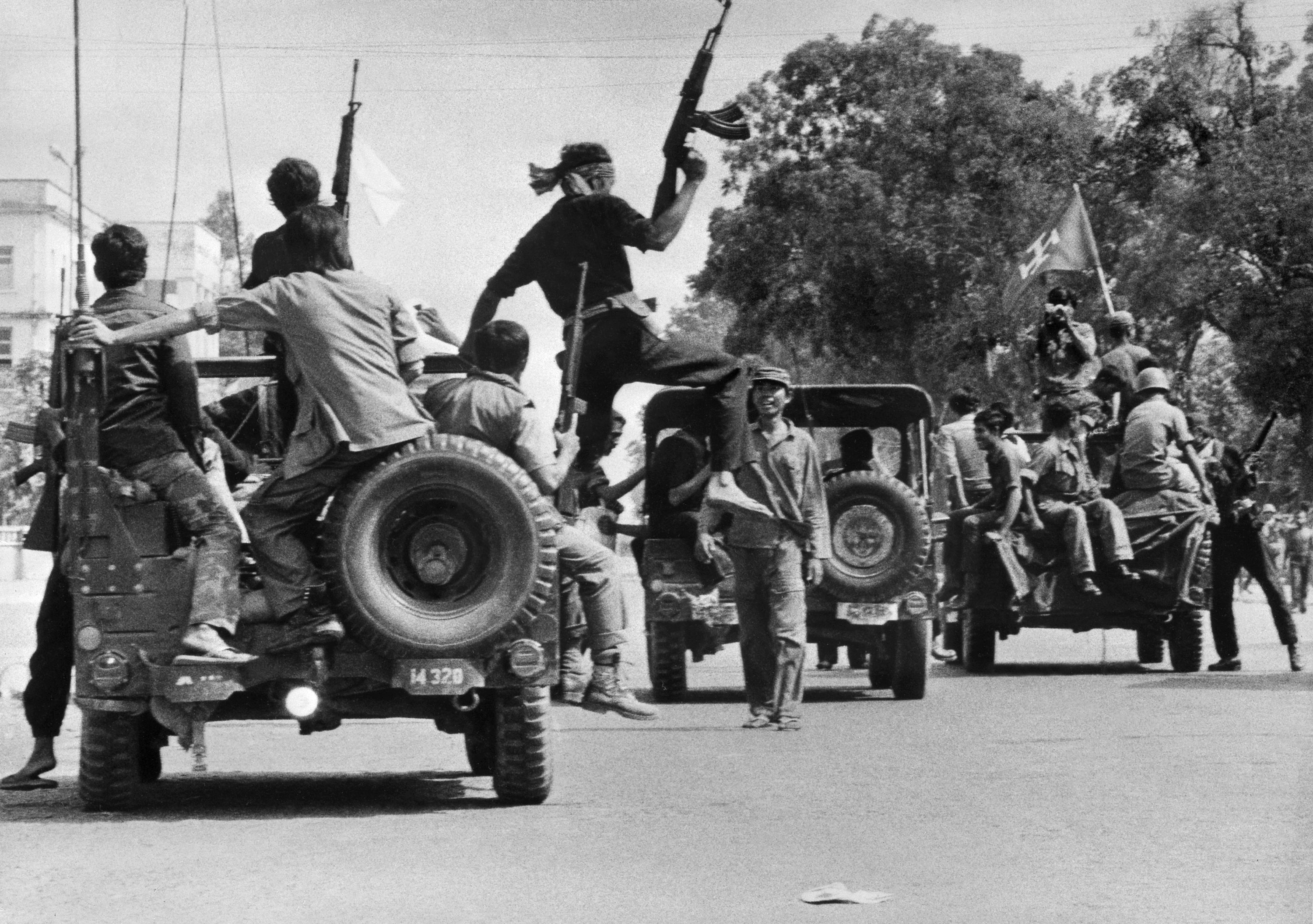
The Culling of Cambodia
Between 1969 and 1973, the United States executed a devastating campaign in Cambodia that Congress, largely unaware of its extent, moved to halt. Over this period, the U.S. dropped around half a million tons of bombs on this neutral country, with Kissinger personally authorising each of the 3,875 bombing raids during 1969-1970, as documented in a later Pentagon report. Estimates vary, but the bombing claimed between 150,000 to half a million Cambodian civilian lives. Moreover, it contributed to a civil war within Cambodia, facilitating the emergence of the Khmer Rouge and Pol Pot, whose brutal regime led to the deaths of as many as 2 million Cambodians according to modern assessments. Kissinger's involvement in negotiating the Paris Peace Accords with North Vietnam in 1973, ostensibly paving the way for the war's end, paradoxically earned him a Nobel Peace Prize, prompting the resignation of two committee members—a dubious acknowledgment of his achievements.
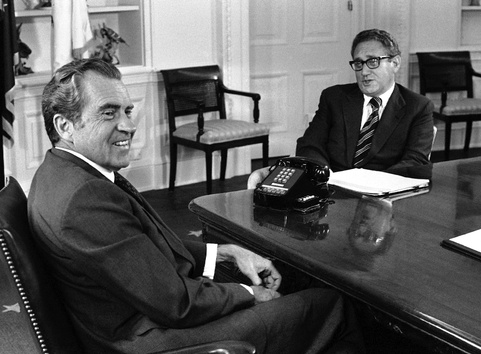
The Way to Watergate
The preceding year marked another significant milestone in Kissinger's career: facilitating Nixon's restoration of diplomatic ties with China, a move perceived as pivotal in creating a schism between China and the Soviet Union, then the world's two principal communist powers. These episodes significantly shaped Kissinger's legacy, elevating his status within the Nixon administration and the broader American foreign policy sphere. While these accomplishments are lauded as enduring victories, their pursuit exacted an appalling human toll directly linked to Kissinger's fervent pursuit of these objectives.
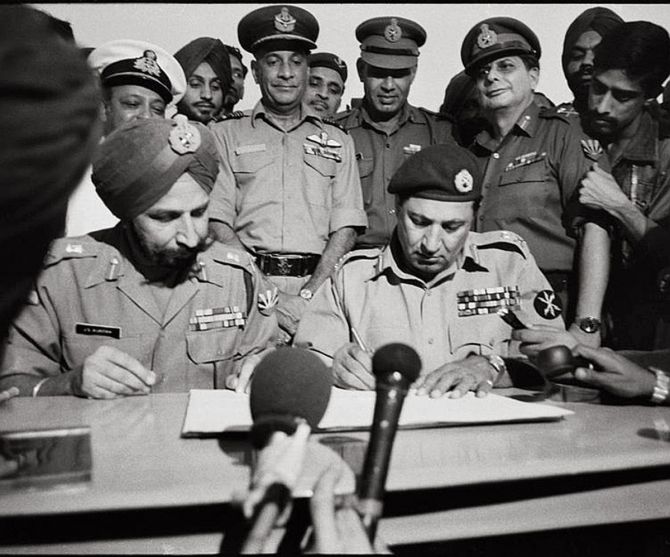
The Butchering of Bangladesh
Comparable to the aftermath of the Vietnam War, the rapprochement with China coincided with an appalling atrocity largely disregarded by the U.S.: the 1971 Pakistani atrocities in what was then East Pakistan, leading to the deaths of at least 500,000 people, later recognised as present-day Bangladesh. Obsessed with fostering ties with Beijing, Nixon and Kissinger deliberately overlooked the aggressive actions of West Pakistan against East Pakistan, viewing West Pakistan as an indispensable ally against the Soviets and a gateway to Chinese diplomatic relations.
Consequently, the Nixon administration largely refrained from condemning West Pakistan's brutal suppression of Bengalis and even authorised potentially illegal arms shipments. The conflict culminated in the birth of independent Bangladesh but not before the loss of millions of lives and widespread atrocities, including the estimated deaths of up to 3 million people and the rape of approximately 400,000 women. This catastrophic crisis displaced millions more.
To Kissinger, the humanitarian crisis seemed inconsequential. In 1971, the Pakistani assistance in facilitating his clandestine visit to China further solidified his belief in the strategic necessity of the relationship. Classified memos revealed Kissinger's persistent indifference toward human rights and democratic values as his career unfolded.
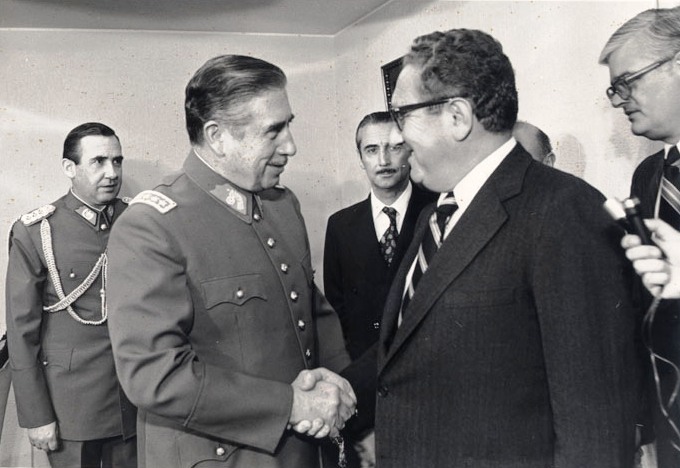
The Chilean Catastrophe
Augusto Pinochet, an Army general, seized power in 1973 with the support of the United States in a coup, initiating a ruthless era of oppression. Despite his awareness of the atrocities and killings occurring under Pinochet's regime, Kissinger viewed him as a bulwark against communism, a stance that clashed with the concerns expressed by his counterparts in the State Department. Dismissing what he perceived as the moralistic inclinations of State Department officials, Kissinger derided their apprehensions regarding the dictatorship's human rights violations. In a 1973 exchange documented by records obtained by the National Security Archive, Kissinger expressed his disdain, stating, "I read the briefing paper for this meeting and it was nothing but Human Rights. The State Department is made up of people who have a vocation for the ministry. Because there are not enough churches for them, they went into the Department of State."
Assuming the role of Secretary of State just a month following Pinochet’s coup, Kissinger informed State Department officials in October 1973 that the United States should not position itself as an advocate against the military regime's human rights abuses. He elucidated that despite the regime's unsavoury conduct, the prevailing U.S. policy was that "no matter how unpleasant they act, the Pinochet government is better for us than Allende was." In a subsequent meeting with Pinochet three years later, concealed documents revealed Kissinger's assertion that the Chilean dictatorship was being victimised by global leftist groups and unfairly tarnished by distorted international propaganda regarding its human rights record. Astonishingly, these details were withheld from a U.S. Senate select committee investigating covert American interventions in the Chilean coup. Kissinger told Pinochet during this encounter, "My evaluation is that you are a victim of all left-wing groups around the world and that your greatest sin was that you overthrew a government that was going Communist."
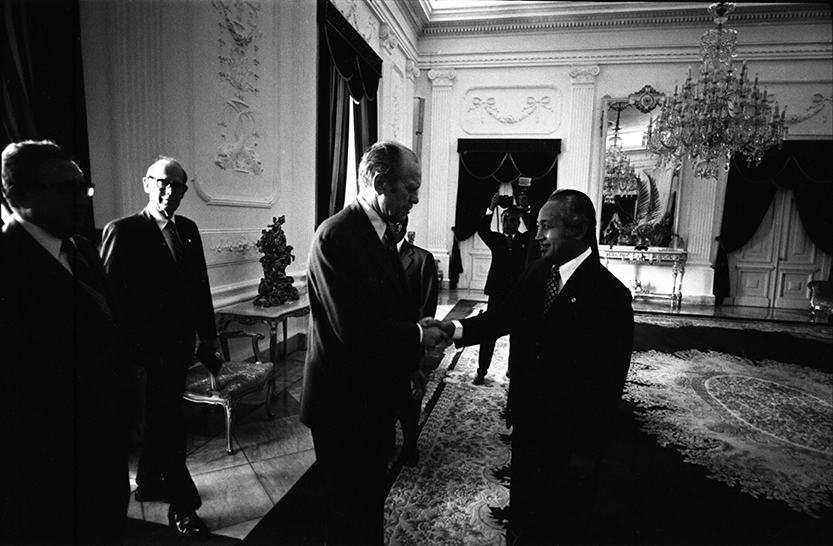
The Incursion into Indonesia
In December 1975, Kissinger and Ford made a trip to Indonesia for a meeting with Suharto, the military dictator who had assumed control of the country following the ousting of Sukarno, an Indonesian nationalist, in 1967. During this encounter, Suharto was contemplating an invasion of neighbouring East Timor, which sought independence. Both the U.S. and Suharto were apprehensive that East Timor's bid for independence might lead to the formation of an anti-colonial government sympathetic to the Soviets. Shortly after Kissinger and Ford's return to the United States, declassified memos revealed that Suharto launched the invasion, with indications that he acted with the explicit backing of the White House. "It is important that whatever you do succeeds quickly," Kissinger reportedly conveyed to Suharto, as per declassified memos obtained by the National Security Archive. He added, "It would be better if it occurred" after their return to the United States.
Subsequently, Indonesian forces conducted what some historians now label as a genocide against the East Timorese populations. Estimates indicate that approximately 2,000 people were killed in the initial days of the invasion alone. A truth and reconciliation committee later suggested that between 100,000 and 200,000 East Timorese people lost their lives during the conflict and the ensuing Indonesian occupation of the island, which persisted until 1999.
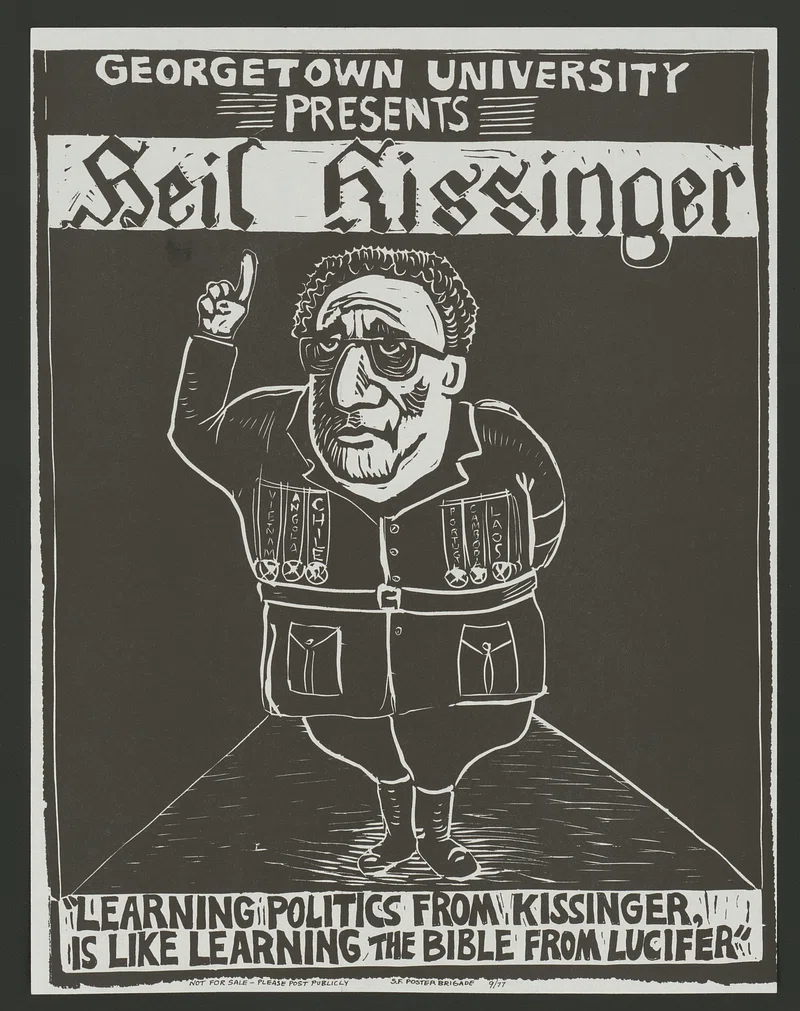
The Aggression into Argentina
During his tenure as secretary of state, Kissinger conveyed analogous messages to Argentina's military dictatorship, which had toppled its government in 1976. During a meeting that year, Kissinger urged the country's foreign minister to swiftly resolve the "terrorist problem," referring to dissidents against the new dictatorship, as revealed by declassified memos from 2002 obtained by the National Security Archive. The Argentine officials left the meeting under the impression that the U.S. had sanctioned their "dirty war" and that Kissinger prioritised eliminating dissenters over human rights concerns. In a similar vein, during a visit to Brazil the same year, Kissinger praised the country's military dictatorship, which had seized power in a coup in 1964, though it was widely acknowledged that the regime was amidst a harsh phase of repression. The country's truth commission in 2014 found that the dictatorship had killed a minimum of 434 political dissidents and tortured thousands more. Kissinger's sympathies for autocratic leaders persisted beyond his government tenure in 1977.
Kissinger's involvement continued as he attended the 1978 World Cup in Argentina as a special guest of Videla, the dictator, and commended the regime for effectively neutralising its adversaries, as revealed in declassified documents from 2016. Concern arose within the State Department that the Argentinian regime might employ Kissinger's supportive remarks to intensify their stance on human rights. The dictatorship, notorious for disposing of dissenters by throwing them out of helicopters into the sea, vanished as many as 30,000 individuals. After his role as national security adviser under Nixon, Kissinger assumed the position of secretary of state under President Gerald Ford. There exists substantial evidence that Kissinger was aware of these numerous abuses throughout his career.
The Chilean Catastrophe (Part II)
During Kissinger's orchestration of the overthrow of Allende's government in Chile, a National Security Council official cautioned that it blatantly contradicted the country's own principles and policy tenets. However, these warnings did not deter Kissinger from instigating coups and praising those responsible for atrocities. Kissinger deemed these atrocities acceptable in order to thwart the spread of Soviet communism and fortify American interests and credibility globally. According to Princeton historian Greg Bass, former President George H.W. Bush, who served as ambassador to the United Nations under Nixon, described Kissinger as paranoid, and this apprehension about communism manifested repeatedly throughout his career. Kissinger perceived Allende's election in Chile as a sign of the unstoppable advance of Marxism that could engulf the world if the U.S. didn't intervene, considering the Pinochet regime's abuses as a necessary sacrifice to halt its progression.
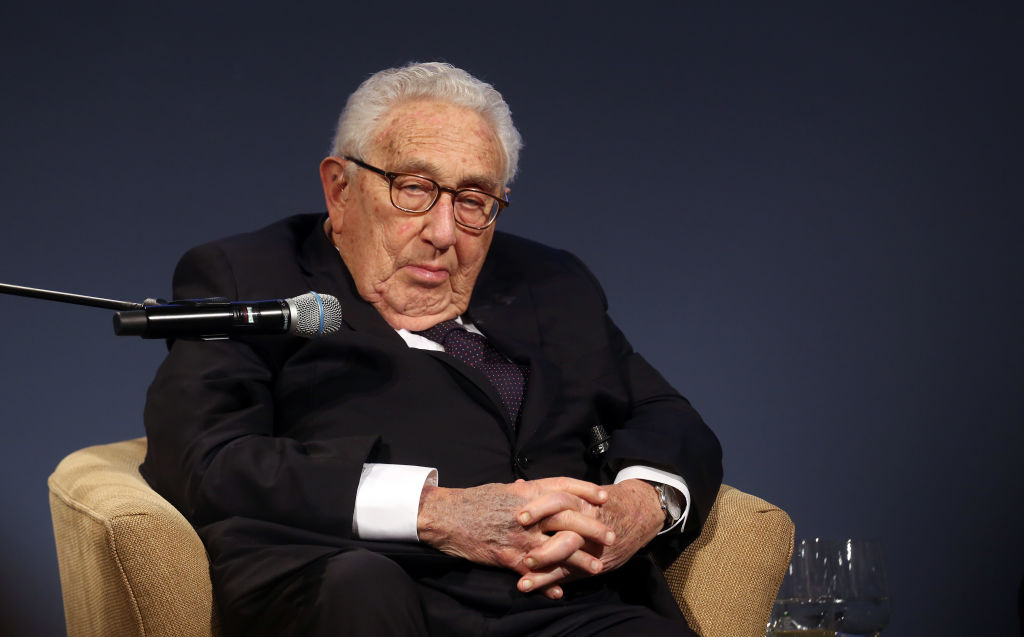
The Absolute Lack of Accountability
Kissinger remained a prominent figure even after leaving the government, offering counsel to various presidents, top diplomats, and influential foreign policy figures. He enjoyed a privileged status, attending elite gatherings in Washington, receiving praise from leaders of both major political parties, and gaining ample opportunities to share his perspectives in the nation's leading newspapers, as well as on major TV and radio networks. Notably, he was an avid supporter of the U.S. invasion of Iraq, advocating for regime change in Baghdad a year before the actual invasion took place in 2003.
Described as an "informal adviser" to President George W. Bush, Vice President Dick Cheney, and top aide Karl Rove during the Iraq war, Kissinger's influence extended amid the conflict, which resulted in a significant civilian death toll and numerous human rights violations. Despite his bipartisan connections, figures like Hillary Clinton sought his advice while simultaneously criticising his stance. Even those who opposed his views, such as Samantha Power, who emphasised human rights in foreign policy, ended up socialising with Kissinger, attending public events, and accepting awards named in his honour.
The enduring impact of Kissinger's influence appears evident in the consequences, whether termed as achievements by his supporters or viewed as detrimental outcomes. It's likely that Kissinger sought to maintain his influence partly to secure his legacy as the foremost foreign policy thinker in American history, regardless of who chronicled it. The United States has a history of overthrowing democratically elected governments, engaging in covert bombing operations, and condoning human rights violations, both before and after Kissinger's tenure. The subsequent decades have witnessed prolonged warfare leading to substantial civilian casualties, expanded use of torture, indefinite detentions, illegal renditions, and extrajudicial killings.
The lack of meaningful consequences faced by the architects of these calamities mirrors Kissinger's own experience. In a country where elite accountability for severe crimes and abuses is scarce, it seems the nation has already formed its stance on the role of morality in politics and public policy, with Kissinger's contribution being more enthusiastic than most. Thus, perhaps the most remarkable aspect of Kissinger's life was how prominently it highlighted an unpleasant truth about the nation he served.
At the time of Henry Kissinger's passing, it remains indisputable that millions of individuals from Argentina, Bangladesh, Cambodia, Chile, East Timor, and other nations cannot voice their perspective on Kissinger's legacy or the world he influenced. Their lives were taken by the despots empowered by Kissinger.
Defining Henry Kissinger's ultimate legacy remains a compelling and critical task pursued by historians, foreign policy experts, and journalists for decades. It serves as an endeavour to determine whether his war crimes rendered him particularly malevolent or if they simply underscore the inevitable challenges of steering a nation as vast as the United States without committing egregious acts.
*The views expressed in this article are personal. They do not reflect the opinions, beliefs, or positions of Vygr and Vygr Media Private Limited.

